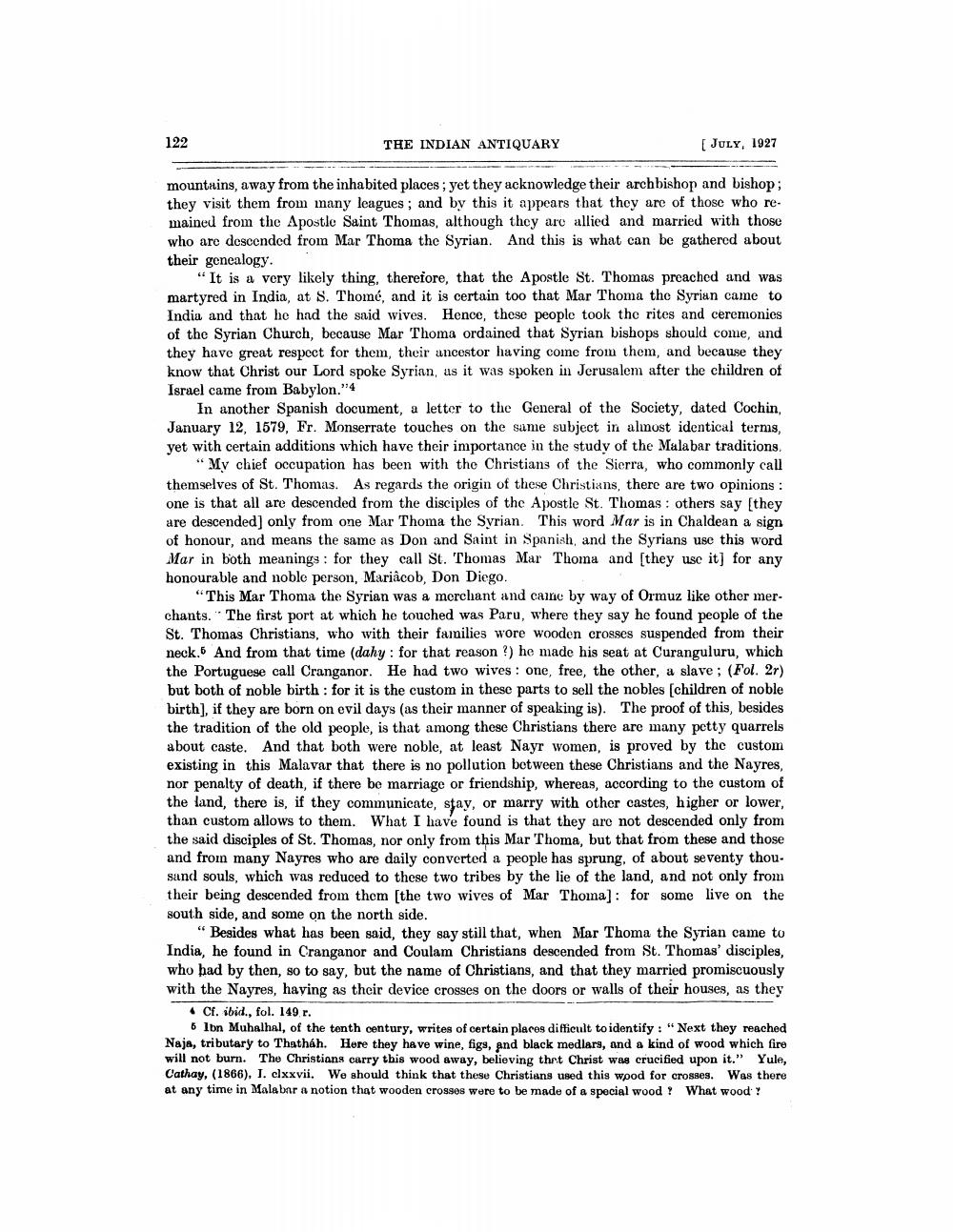________________
122
THE INDIAN ANTIQUARY
[ JULY, 1927
mountains, away from the inhabited places; yet they acknowledge their archbishop and bishop; they visit them from many leagues; and by this it appears that they are of those who remained from the Apostle Saint Thomas, although they are allied and married with those who are descended from Mar Thoma the Syrian. And this is what can be gathered about their genealogy
" It is a very likely thing, therefore, that the Apostle St. Thomas preached and was martyred in India, at S. Thomé, and it is certain too that Mar Thoma the Syrian came to India and that he had the said wives. Hence, these people took the rites and ceremonies of the Syrian Church, because Mar Thoma ordained that Syrian bishops should come, and they have great respect for them, their ancestor having come from them, and because they know that Christ our Lord spoke Syrian, as it was spoken in Jerusalem after the children of Israel came froin Babylon."4
In another Spanish document, a letter to the General of the Society, dated Cochin, January 12, 1579, Fr. Monserrate touches on the same subject in almost identical terms, yet with certain additions which have their importance in the study of the Malabar traditions
"My chief occupation has been with the Christians of the Sierra, who commonly call themselves of St. Thomas. As regards the origin of these Christians, there are two opinions : one is that all are descended from the disciples of the Apostle St. Thomas : others say (they are descended] only from one Mar Thoma the Syrian. This word Mar is in Chaldean a sign of honour, and means the same as Don and Saint in Spanish, and the Syrians use this word Mar in both meanings : for they call St. Thomas Mar Thoma and (they use it] for any honourable and noble person. Mariâcob, Don Diego.
"This Mar Thoma the Syrian was a merchant and came by way of Ormuz like other merchants. The first port at which he touched was Paru, where they say he found people of the St. Thomas Christians, who with their families wore wooden crosses suspended from their neck.5 And from that time (dahy: for that reason ?) he made his seat at Curanguluru, which the Portuguese call Cranganor. He had two wives: one, free, the other, a slave ; (Fol. 2r) but both of noble birth: for it is the custom in these parts to sell the nobles (children of noble birth), if they are born on evil days (as their manner of speaking is). The proof of this, besides the tradition of the old people, is that among these Christians there are many petty quarrels about caste. And that both were noble, at least Nayr women, is proved by the custom existing in this Malavar that there is no pollution between these Christians and the Nayres, nor penalty of death, if there be marriage or friendship, whereas, according to the custom of the land, there is, if they communicate, stay, or marry with other castes, higher or lower, than custom allows to them. What I have found is that they are not descended only from the said disciples of St. Thomas, nor only from this Mar Thoma, but that from these and those and from many Nayres who are daily converted a people has sprung, of about seventy thousand souls, which was reduced to these two tribes by the lie of the land, and not only from their being descended from them (the two wives of Mar Thoma]: for some live on the south side, and some on the north side.
“Besides what has been said, they say still that, when Mar Thoma the Syrian came to India, he found in Cranganor and Coulam Christians descended from St. Thomas' disciples, who had by then, so to say, but the name of Christians, and that they married promiscuously with the Nayres, having as their device crosses on the doors or walls of their houses, as they
4 Cf. ibid., fol. 149.r.
6 Ibn Muhalhal, of the tenth century, writes of certain places difficult to identify: "Next they reached Naja, tributary to Thatháh. Here they have wine, figs, and black medlars, and a kind of wood which fire will not burn. The Christians carry this wood away, believing thrt Christ was crucified upon it." Yule, Cathay, (1866), l. clxxvii. We should think that these Christians used this wpod for crosses. Was there at any time in Malabar a notion that wooden crosses were to be made of a special wood! What wood!




